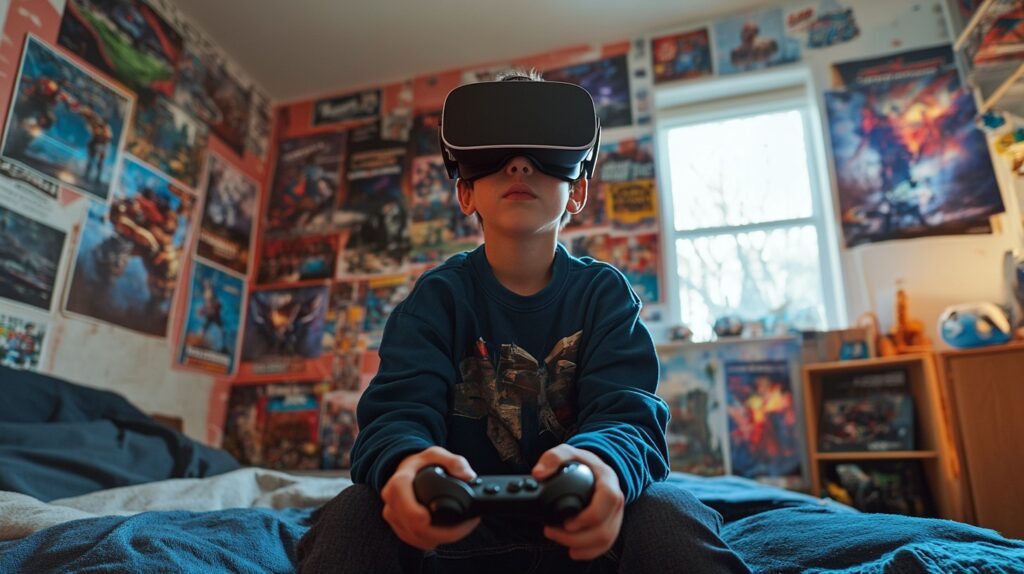Video games have become a ubiquitous part of the daily lives of many children worldwide. Far from being mere entertainment, they are the subject of constant debate regarding their influence on child development. This article explores in depth the multifaceted aspects of this impact, drawing on scientific research and distinguishing potential positive effects from potential risks.
Positive Impacts of Video Games on Child Development
Contrary to popular belief, numerous studies highlight potential benefits of video games on child development:
1.1 Enhanced Cognitive Development:
- Improved Attention and Concentration: Some games, especially those requiring rapid decision-making and tracking multiple pieces of information, can strengthen selective and sustained attention skills.
- Stimulation of Problem-Solving and Strategic Thinking: Many games require players to develop strategies, solve puzzles, and make complex decisions to progress. Real-time strategy (RTS) games or role-playing games (RPGs) are particularly relevant here.
- Strengthening Working Memory and Spatial Abilities: Games that require players to remember maps, instructions, or sequences can improve working memory. 3D games can also stimulate spatial perception and mental rotation of objects .
- Development of Creativity and Imagination: Building games (like Minecraft) or narrative games offer children spaces to express their creativity, imagine scenarios, and construct virtual worlds.
1.2 Social and Collaborative Development:
- Learning Cooperation and Teamwork: Online multiplayer games often require close collaboration between players to achieve common goals. This fosters the learning of teamwork, communication, and coordination.
- Development of Social Skills and Communication: Interacting with other players in virtual environments can help children develop their social skills, negotiate, resolve conflicts, and understand different perspectives.
- Creation of Communities and Sense of Belonging: Online games can create communities where children share common interests, support each other, and develop a sense of belonging.
1.3 Emotional Development:
- Managing Emotions and Frustration: Video games often present challenges that can lead to frustration. Learning to persevere, manage emotions in the face of failure, and celebrate successes are important skills that can be developed in a playful environment.
- Development of Empathy (in some games): Some narrative games place players in situations where they must make moral decisions and consider the consequences of their actions on virtual characters, which can potentially foster the development of empathy.
- Stress Relief and Entertainment: Video games can offer a pleasant distraction, allowing children to relax, have fun, and reduce their stress levels.
1.4 Physical Development (in some cases):
- Improved Hand-Eye Coordination and Reflexes: Action games and games requiring rapid movements can improve coordination between the eyes and hands, as well as reaction times.
- Promotion of Physical Activity (with active games): Active video games (exergames) that require physical movement can encourage exercise and contribute to better physical fitness.

Potential Risks and Negative Impacts of Video Games on Child Development
Despite the potential benefits, excessive or inappropriate use of video games can lead to negative effects:
2.1 Impacts on Physical Health:
- Sedentary Behavior and Obesity: Spending long hours sitting while playing can contribute to a sedentary lifestyle and increase the risk of obesity.
- Vision Problems: Prolonged exposure to screens can lead to eye strain, dry eyes, and, in some cases, an increased risk of myopia.
- Sleep Disturbances: Playing late at night or playing stimulating games can disrupt sleep cycles and lead to insomnia or poor sleep quality.
- Musculoskeletal Problems: Poor posture and repetitive movements can lead to pain in the neck, wrists, and hands.
2.2 Impacts on Cognitive Development:
- Difficulty Concentrating in Other Areas: Excessive exposure to fast-paced and stimulating games can potentially make children less patient and less able to focus on slower-paced tasks requiring sustained attention.
- Impact on Academic Performance: Excessive time spent playing video games can encroach on time dedicated to studying, homework, and reading, which can result in a decline in academic performance.
2.3 Impacts on Social and Emotional Development:
- Social Isolation and Relational Difficulties in the Real World: Excessive investment in virtual worlds can lead to social isolation and difficulties in forming and maintaining healthy relationships in real life.
- Aggressive Behaviors and Desensitization to Violence: Repeated exposure to violent games can potentially lead to desensitization to violence, aggressive thoughts, and, in rare cases, an increase in aggressive behaviors, although this link is still widely debated and influenced by many factors.
- Development of Addiction and Problematic Behaviors: For some children, video games can become a compulsive activity, leading to negative consequences on their social, academic, and family life.
Moderating Factors and the Role of Parents and Educators
The impact of video games on child development is not uniform and depends on several factors:
- The type of game: Educational games, strategy games, creative games, and active games can have different effects than violent games or simulated gambling games.
- The amount of time spent playing: Moderation is essential. Excessive playtime is more likely to lead to negative effects.
- The age of the child: Younger children are often more vulnerable to the potential effects of video games.
- The social and family context: Parental support, open communication, and clear rules regarding screen time play a crucial role.
- The individual characteristics of the child: Personality, predispositions, and other activities of the child also influence the impact of video games.
The role of parents and educators is paramount in guiding children’s use of video games:
- Establish clear and consistent time limits.
- Choose games that are age-appropriate and developmentally suitable.
- Encourage a variety of activities (sports, reading, real-world social activities).
- Play with the child to understand the content of the games and encourage discussion.
- Be attentive to signs of addiction or problematic behaviors.
- Promote a balanced and responsible use of digital technologies.
Conclusion: Towards Informed and Balanced Use
The impact of video games on child development is complex and multifaceted. They can offer opportunities for learning, cognitive, social, and emotional development, but also present potential risks to physical and mental health. The challenge is not to ban video games, but rather to encourage informed and balanced use, guided by responsible adults. By understanding the potential benefits and drawbacks, parents and educators can help children navigate the digital landscape in a healthy and constructive way, leveraging the benefits while minimizing the risks.












No Comment! Be the first one.